Oct 2016
"Are you up to it?"
October 26 2016 03:05 PM Filed in: Children 1950s
All the kids in the neighbourhood walked to school. It’s what kids have done for ever. We went to Bennettswood State School from 1956, Sue in Grade three, Margaret in Bubs (prep). Our journey took us through neighbourhood streets and lanes, and through a bushland, urban waste area and along and across the Gardiners Creek. This was our usual way to school from then until we each finished High School, Sue in 1966 and me in 1968.
So now, sixty years later, we contemplated walking it again, those same roads and lanes, across that same creek. In our memories it was a long long way. “Are you up to it?”, Margaret texted Sue.
We park outside our old house in Moore Street and set off. And as we walk we remember:
Less than a minute into the walk, we round the corner into Grandview Road. To the west are the Dandenongs. The street trees are large and bright in their early Spring colours. It’s suburban, but well heeled and attractively quiet. We remark on a number of houses that seem unchanged. There’s the house where I babysat once, there’s another one where people from the church lived.
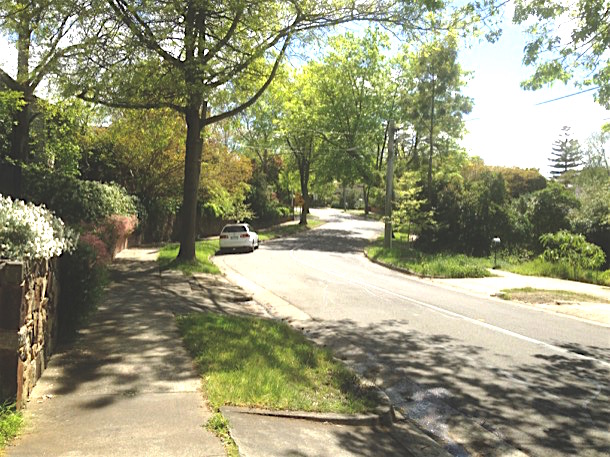
As we did this walk every school day, rain, hail or shine, we developed little rituals and markers, that now sixty years later we remember clearly. We often began our journey down Grandview Road, kicking a stone that we attempted to keep all the way to school. We don't think we ever succeeded.
Bright pink pig face flowers in spring marked the bottom of the hill. If the sun was out we always stopped and stared into the flowers for long enough for the world to turn green when we looked away. of course they are no longer there, but the rockery is.
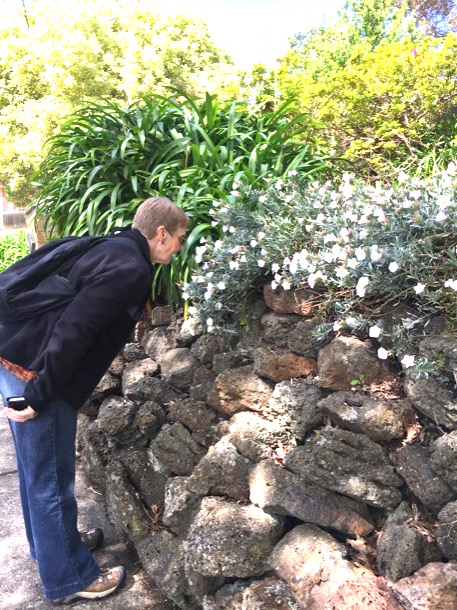
“That’s the street to the Church just there! It’s so tiny! Everything is so close”
We have reached the bottom of Grandview Road in seemingly record time now the distances seem so small.
“I always liked this bit.”
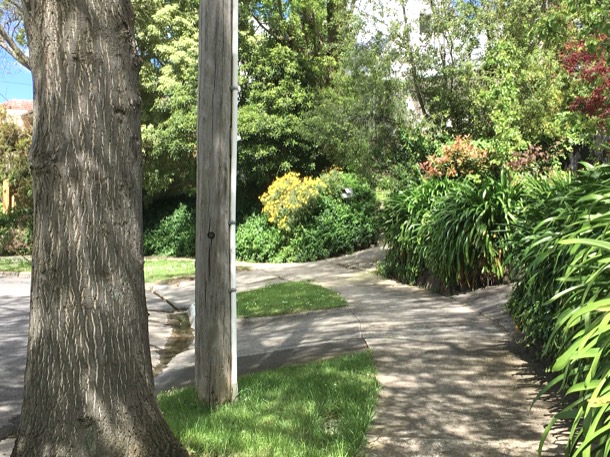
Heading towards Riversdale Road, still in Grandview Road we relive our childhood pleasure in beautiful gardens and leafy streets.
Riversdale Road is quite a major road, but still not too busy. Across from the end of Grandview Road is the entrance to “the lane”.
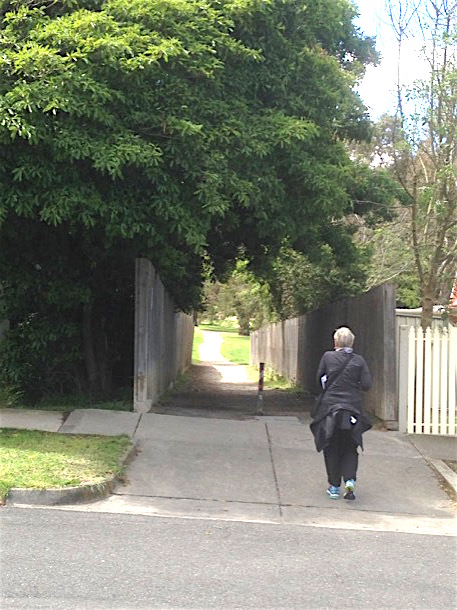
It runs alongside the house that our church minister and family friend lived in. Behind their house were the church tennis courts. That whole property is now a collection of ugly units.The lane continues a long way down the hill toward the creek. At every cross road is an opportunity to go a different way through the grid of streets.
We walk along Neville Street and remark on the difference in this much lower socio economic area. Many of the old public housing houses are still there, unchanged from the nineteen fifties’ building boom. They are noticeable different in style from the “private “ housing and, as children, we knew that they were “housing commission” houses and that they were for poor people.
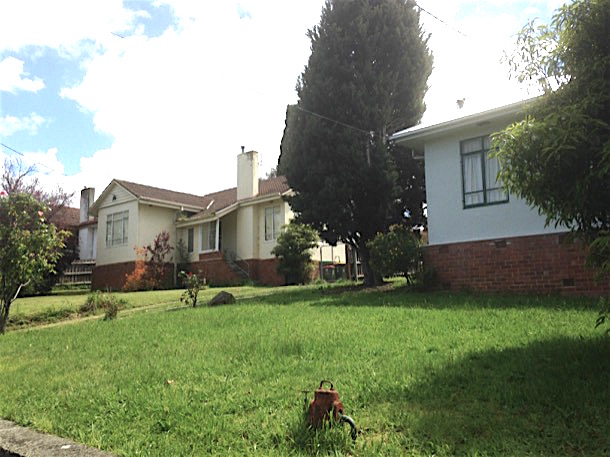
At the bottom of Stott Street we turn into yet another lane and at the other end we emerge into a green oasis.

Dogs are running free, chasing balls and each other, rolling in muddy puddles. Their young owners stand and chat. Up the hill a bit is a natural wood playground: slides, climbing frames, tasteful little forts. Further down the hill is a fenced off area of native bushland and, running through that the Gardiner's Creek. Well tended paths run along both sides of the creek and up to the adjoining streets. A noticeboard has a bird list and information about plans for improvement of the area. It is a pleasant Spring afternoon and Deakin students are strolling or jogging.
We conjure memories of how it was. This, the floodplain of Gardiner's Greek was the ‘wild’ section of the journey. The raised path, built by the fathers of the children who used this track daily, snaked its way across the grassed floodplain towards the bridge, also built by the fathers.
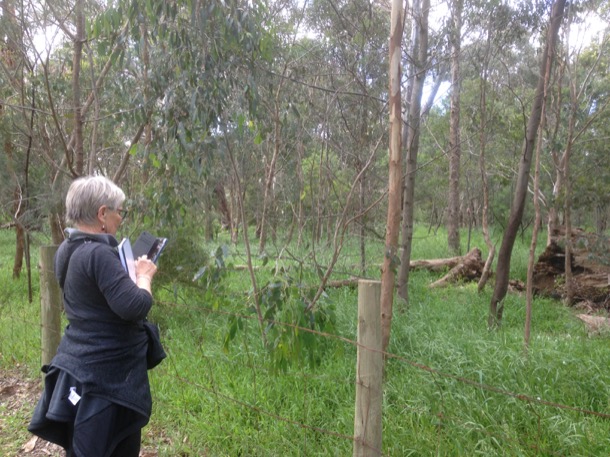
One old River Red-gum marked one of the bends in the path and large clumps of blackberries hid the creek from view. It was not the cherished indigenous community park it is now, but was a neglected wasteland. However it was interesting and often beautiful, especially in the morning. Sometimes we emerged from the lane to a white icy world, where spider webs hung between frosty grass stalks, glistening in the early morning sun. Sometimes the creek flooded. This was very exciting. We walked on the raised pathway, floodwaters on either side, wondering if the bridge was flooded. The water never covered the high bridge but the muddy torrent came very close.
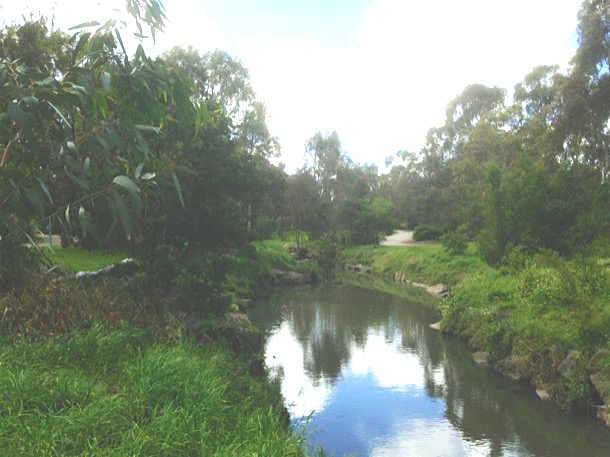
On up the small hill past paling fences that belonged to cream brick houses we emerged on the school oval, the classrooms in the distance. Nowadays it is a multi story carpark.
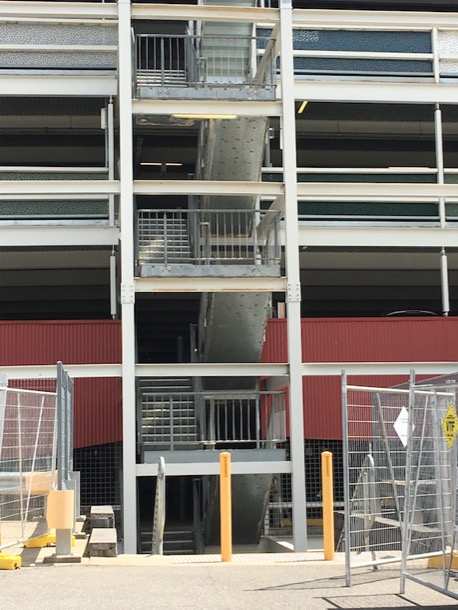
Our little school has been completely swallowed by Deakin University, along with the Teachers College and our secondary school, Burwood High School. We walk onto campus, and there, in the middle of the glamorous uni buildings is a little row of ex classrooms. There on the end is where my Grade four room was, here's the breezeway. Up on the edge is the quadrangle where we practised marching. There was a breezeway along there and Mr Stafford's classroom.
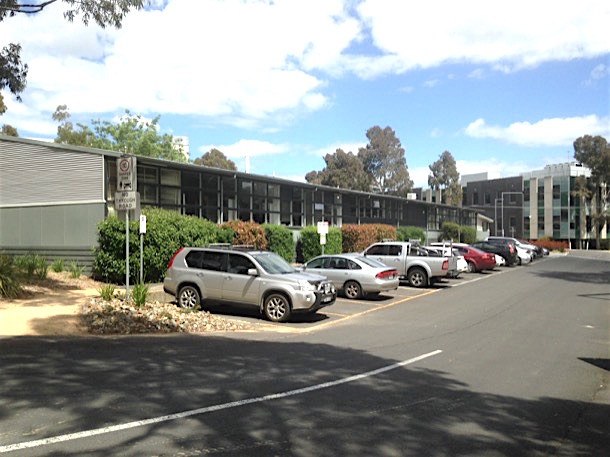
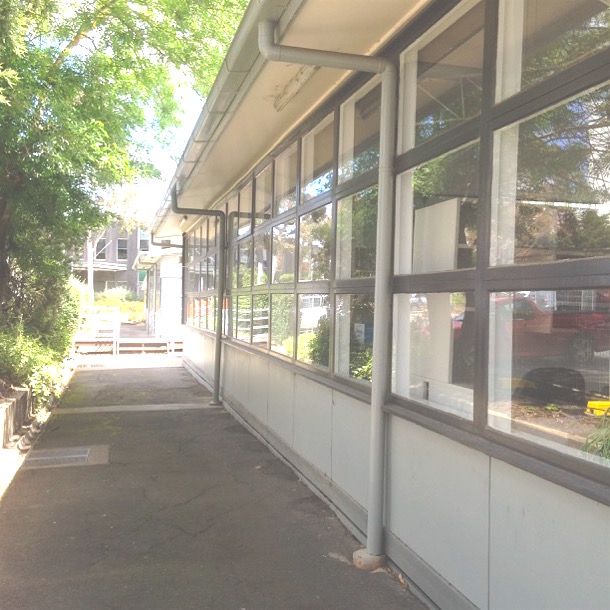
We set off past the car park again, cross the creek and head back into the criss cross of familiar streets.
At the corner of Cadorna and Inverloch Streets we work out the place where “the accident” happened.
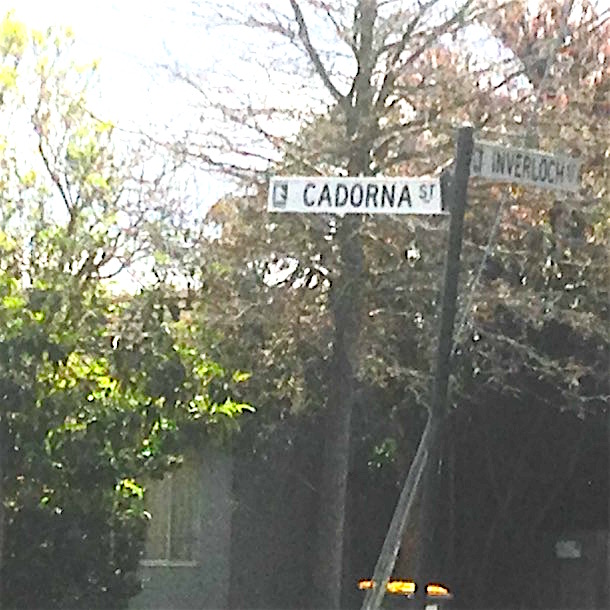
We remember it very differently of course: one of us watched in horror, the other was a participant. Here are our separate memories of it:
Sue:
Summer was a hot and dusty trek back across the creek after a full day at school. Once we had left the creek and started the climb up the hill in the hot suburban streets it was a bit of a slog. One such hot summer afternoon Margaret I were walking home with lan who was in Prep and the usual tribe of kids spread out across the two sides of the road. Margaret, seeing a friend on the other side of the road ran onto the road, straight into the path of an oncoming car. I don't remember much of the accident itself but I do remember a crowd of children and helpful women surrounding us as Margaret lay on the nature strip bloodied and battered with her head on my lap. The distraught young driver of the ute drove to get Mum (no mobiles) while we waited for the ambulance. Margaret disappeared with Mum into the back of an ambulance and Ian and I walked home.
Margaret:
I was nine, in Grade four. We were on the long walk home up the hill. Ian and Sue were there and lots of other kids. I ran across the road without looking, and was hit by a ute driving along Cadorna Street. It was a Friday.
After the accident I lay on the nature strip. “Ladies” from nearby houses tried to cover me with blankets, which I found irritating and pushed away. I remember Mum arriving and the ambulance. From my vantage point in the ambulance I remember seeing the corner of Riverside and Station Streets, as Mum told them they should be turning left not right.
At the Box Hill Hospital, I remember the decision of the doctor to pull out the tooth that was hanging loose. Two other teeth had been knocked right out, both of which had had gold fillings painfully inserted over the previous year, after an accident at gym.
At some stage there was a police interview. I remember Mum describing this process to someone else and laughing about the look on the Policeman’s face as he gently tried to coax information from me only to be presented with a dramatic and colourful description in far more detail than the poor man needed.
I remember coming home later that night. And then, possibly over the weekend, before I went back to school, I got mumps.
People bought presents: colouring books, a white china horse.
I guess the severity of the accident was exaggerated by the fact that I was laid up for weeks with mumps.
The sustained ongoing result of the accident was the absence of my three front teeth. Nowadays there would be counselling, PTSD and expensive restorative dental work.
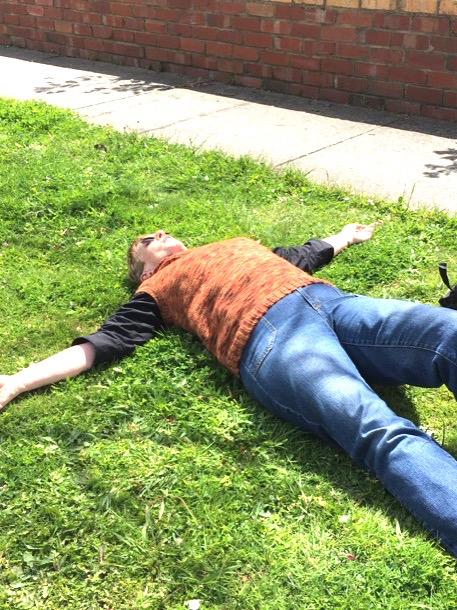
After the accident reenactment we begin to walk up lnverloch Street. It is long, steep and dull. There are no leafy street trees and interesting gardens. It feels like a concrete jungle. We reminisce about hot afternoons trudging up here lugging our school cases. We turn right at the first cross street, relieved to be able to use the lane instead.
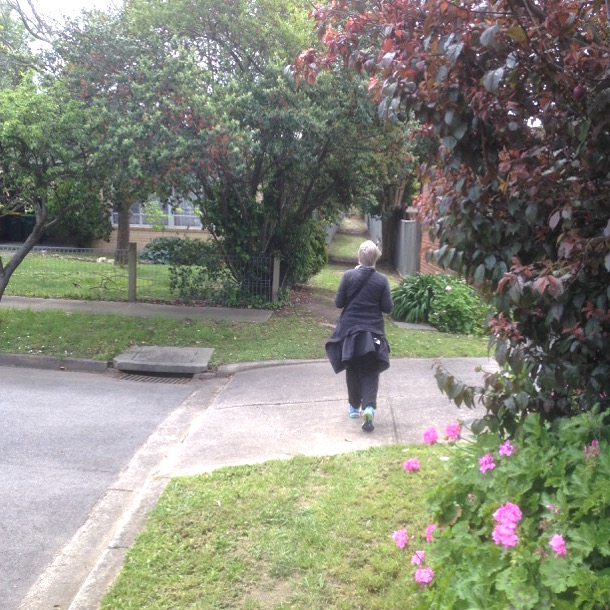
The lane takes us to the same place, the corner of Riversdale and Grandview roads, but it is much less steep. Soon we are crossing Riversdale Road and we remember the leafy cool shade of this part of the journey. It has seemed like a long way and we find ourselves trudging a bit up the hill.
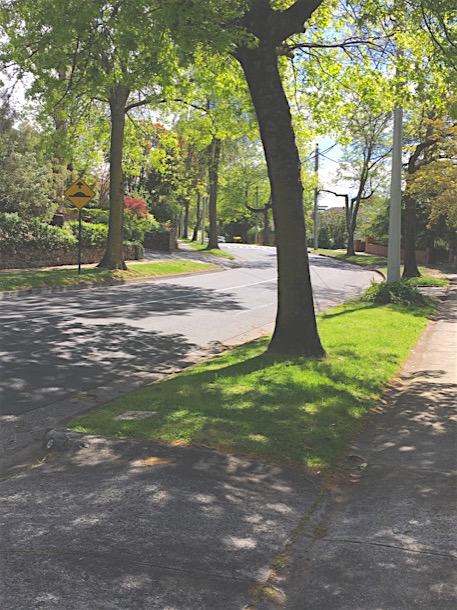
The homeward journey has taken about an hour, including the accident reenactment, stopping to gaze at houses we remember and a conversation with a lady in Neville Street who was interested to know what we strangers were doing in her street, where she knew all her neighbours, “except the Chinese who keep to themselves”. It’s a pretty fair representation of what our trip home would have been like. School finished at 3.30. So we would have been turning into the Moore Street driveway about 4.30.
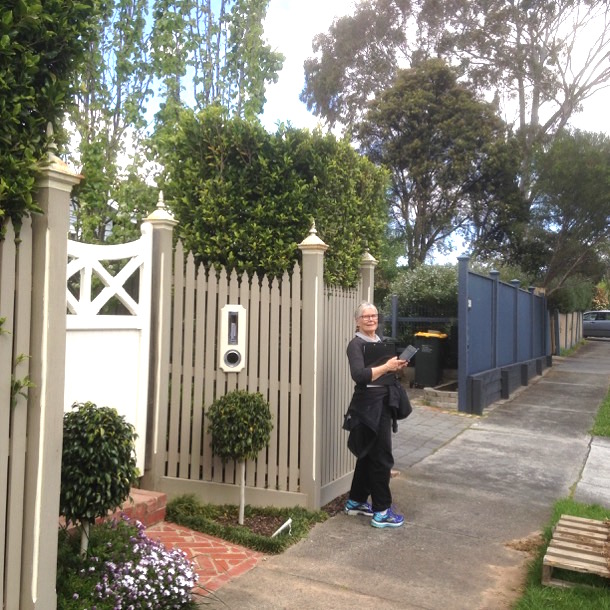
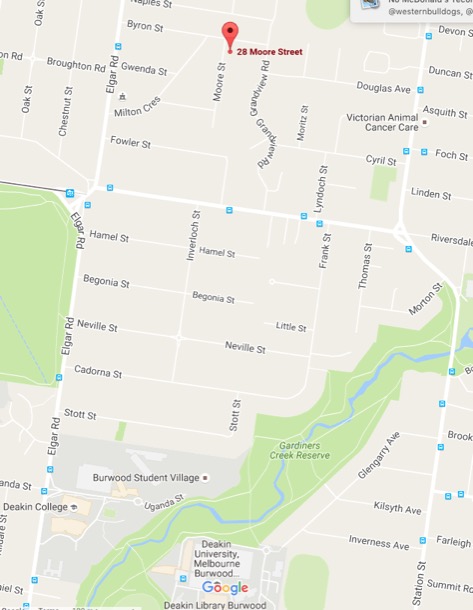
So now, sixty years later, we contemplated walking it again, those same roads and lanes, across that same creek. In our memories it was a long long way. “Are you up to it?”, Margaret texted Sue.
We park outside our old house in Moore Street and set off. And as we walk we remember:
Less than a minute into the walk, we round the corner into Grandview Road. To the west are the Dandenongs. The street trees are large and bright in their early Spring colours. It’s suburban, but well heeled and attractively quiet. We remark on a number of houses that seem unchanged. There’s the house where I babysat once, there’s another one where people from the church lived.

As we did this walk every school day, rain, hail or shine, we developed little rituals and markers, that now sixty years later we remember clearly. We often began our journey down Grandview Road, kicking a stone that we attempted to keep all the way to school. We don't think we ever succeeded.
Bright pink pig face flowers in spring marked the bottom of the hill. If the sun was out we always stopped and stared into the flowers for long enough for the world to turn green when we looked away. of course they are no longer there, but the rockery is.

“That’s the street to the Church just there! It’s so tiny! Everything is so close”
We have reached the bottom of Grandview Road in seemingly record time now the distances seem so small.
“I always liked this bit.”

Heading towards Riversdale Road, still in Grandview Road we relive our childhood pleasure in beautiful gardens and leafy streets.
Riversdale Road is quite a major road, but still not too busy. Across from the end of Grandview Road is the entrance to “the lane”.

It runs alongside the house that our church minister and family friend lived in. Behind their house were the church tennis courts. That whole property is now a collection of ugly units.The lane continues a long way down the hill toward the creek. At every cross road is an opportunity to go a different way through the grid of streets.
We walk along Neville Street and remark on the difference in this much lower socio economic area. Many of the old public housing houses are still there, unchanged from the nineteen fifties’ building boom. They are noticeable different in style from the “private “ housing and, as children, we knew that they were “housing commission” houses and that they were for poor people.

At the bottom of Stott Street we turn into yet another lane and at the other end we emerge into a green oasis.

Dogs are running free, chasing balls and each other, rolling in muddy puddles. Their young owners stand and chat. Up the hill a bit is a natural wood playground: slides, climbing frames, tasteful little forts. Further down the hill is a fenced off area of native bushland and, running through that the Gardiner's Creek. Well tended paths run along both sides of the creek and up to the adjoining streets. A noticeboard has a bird list and information about plans for improvement of the area. It is a pleasant Spring afternoon and Deakin students are strolling or jogging.
We conjure memories of how it was. This, the floodplain of Gardiner's Greek was the ‘wild’ section of the journey. The raised path, built by the fathers of the children who used this track daily, snaked its way across the grassed floodplain towards the bridge, also built by the fathers.

One old River Red-gum marked one of the bends in the path and large clumps of blackberries hid the creek from view. It was not the cherished indigenous community park it is now, but was a neglected wasteland. However it was interesting and often beautiful, especially in the morning. Sometimes we emerged from the lane to a white icy world, where spider webs hung between frosty grass stalks, glistening in the early morning sun. Sometimes the creek flooded. This was very exciting. We walked on the raised pathway, floodwaters on either side, wondering if the bridge was flooded. The water never covered the high bridge but the muddy torrent came very close.

On up the small hill past paling fences that belonged to cream brick houses we emerged on the school oval, the classrooms in the distance. Nowadays it is a multi story carpark.

Our little school has been completely swallowed by Deakin University, along with the Teachers College and our secondary school, Burwood High School. We walk onto campus, and there, in the middle of the glamorous uni buildings is a little row of ex classrooms. There on the end is where my Grade four room was, here's the breezeway. Up on the edge is the quadrangle where we practised marching. There was a breezeway along there and Mr Stafford's classroom.


We set off past the car park again, cross the creek and head back into the criss cross of familiar streets.
At the corner of Cadorna and Inverloch Streets we work out the place where “the accident” happened.

We remember it very differently of course: one of us watched in horror, the other was a participant. Here are our separate memories of it:
Sue:
Summer was a hot and dusty trek back across the creek after a full day at school. Once we had left the creek and started the climb up the hill in the hot suburban streets it was a bit of a slog. One such hot summer afternoon Margaret I were walking home with lan who was in Prep and the usual tribe of kids spread out across the two sides of the road. Margaret, seeing a friend on the other side of the road ran onto the road, straight into the path of an oncoming car. I don't remember much of the accident itself but I do remember a crowd of children and helpful women surrounding us as Margaret lay on the nature strip bloodied and battered with her head on my lap. The distraught young driver of the ute drove to get Mum (no mobiles) while we waited for the ambulance. Margaret disappeared with Mum into the back of an ambulance and Ian and I walked home.
Margaret:
I was nine, in Grade four. We were on the long walk home up the hill. Ian and Sue were there and lots of other kids. I ran across the road without looking, and was hit by a ute driving along Cadorna Street. It was a Friday.
After the accident I lay on the nature strip. “Ladies” from nearby houses tried to cover me with blankets, which I found irritating and pushed away. I remember Mum arriving and the ambulance. From my vantage point in the ambulance I remember seeing the corner of Riverside and Station Streets, as Mum told them they should be turning left not right.
At the Box Hill Hospital, I remember the decision of the doctor to pull out the tooth that was hanging loose. Two other teeth had been knocked right out, both of which had had gold fillings painfully inserted over the previous year, after an accident at gym.
At some stage there was a police interview. I remember Mum describing this process to someone else and laughing about the look on the Policeman’s face as he gently tried to coax information from me only to be presented with a dramatic and colourful description in far more detail than the poor man needed.
I remember coming home later that night. And then, possibly over the weekend, before I went back to school, I got mumps.
People bought presents: colouring books, a white china horse.
I guess the severity of the accident was exaggerated by the fact that I was laid up for weeks with mumps.
The sustained ongoing result of the accident was the absence of my three front teeth. Nowadays there would be counselling, PTSD and expensive restorative dental work.

After the accident reenactment we begin to walk up lnverloch Street. It is long, steep and dull. There are no leafy street trees and interesting gardens. It feels like a concrete jungle. We reminisce about hot afternoons trudging up here lugging our school cases. We turn right at the first cross street, relieved to be able to use the lane instead.

The lane takes us to the same place, the corner of Riversdale and Grandview roads, but it is much less steep. Soon we are crossing Riversdale Road and we remember the leafy cool shade of this part of the journey. It has seemed like a long way and we find ourselves trudging a bit up the hill.

The homeward journey has taken about an hour, including the accident reenactment, stopping to gaze at houses we remember and a conversation with a lady in Neville Street who was interested to know what we strangers were doing in her street, where she knew all her neighbours, “except the Chinese who keep to themselves”. It’s a pretty fair representation of what our trip home would have been like. School finished at 3.30. So we would have been turning into the Moore Street driveway about 4.30.


Comments
